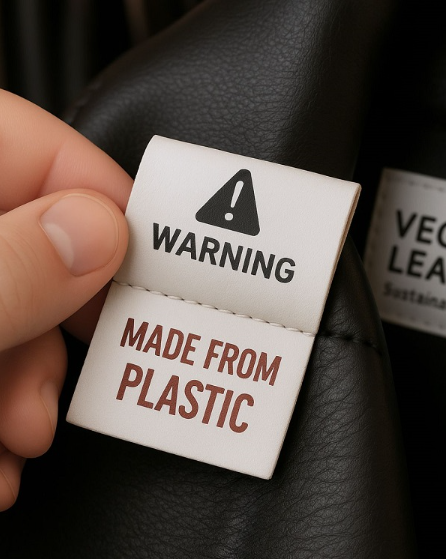Is it Leather? Writes on LinkedIn: Let’s get one thing straight: just because a tag says “eco-friendly” doesn’t mean it is.
In today’s retail landscape, greenwashing is a marketing strategy that promotes lies and deception – not a promise to be trusted.
We’re surrounded by buzzwords: “sustainable,” “vegan,” “cruelty-free,” “eco-leather,” “plant-based,” “responsibly made.” But what do they actually mean?
Often… nothing. Or worse — something misleading.
Labels today are a smokescreen. There are no global standards. No real enforcement. No universal definitions. Companies can print nearly anything on a tag, and the burden of truth falls squarely on the consumer.
That puts you – the consumer – on the front line of the war against real leather.
You’re the last checkpoint between smart consumption and another pile of greenwashed garbage headed for landfills or washing ashore in India.
If it sounds too good to be true – especially for the price – it probably is.
A handbag that claims to be “sustainable,” “vegan,” and $49? Let’s be honest: that’s not sustainability. That’s a plastic purse in a feel-good costume.
Worse yet is the myth that leather is somehow unethical. That by choosing leather, you’re choosing animal cruelty. Retailers have leaned hard into this narrative – using “cruelty-free” and “animal-free” labels like moral high ground. But here’s the uncomfortable truth:
Cows are not killed for leather. Leather is a byproduct of the meat and dairy industry – a material that already exists, whether we use it or not.
And unless you are part of the 20% of the global population that doesn’t consume meat, discarding hides is not a win for animals. It’s a loss for the planet.
Tanning leather from byproduct hides is one of the most sustainable choices we can make. It diverts waste, extends the value of a life already taken, and creates a long-lasting, biodegradable material.
Plastic alternatives? They’re made from fossil fuels, don’t biodegrade, pollute during production, and shed microplastics for centuries. That’s not progress. That’s pollution in disguise.
Feeling good about a purchase isn’t the same as making a good purchase. Trusting claims is easy. Unfortunately it’s also lazy and it gives bad actors the cover they need to sell you something horrible for the environment.
So: Read the label. Investigate the words. Follow the material trail. Know what you’re wearing and who it impacts. Because sustainability doesn’t live on a tag – it lives in your decision.
